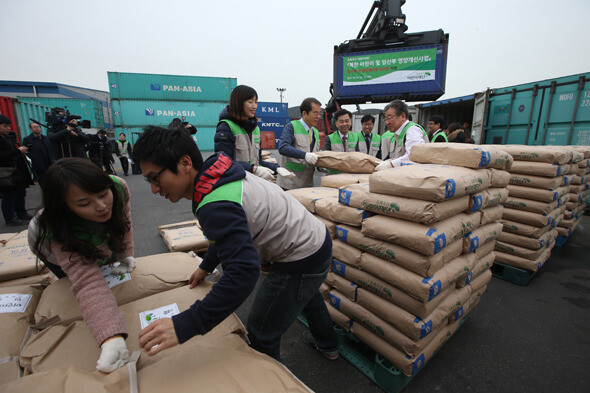hankyoreh
Links to other country sites 다른 나라 사이트 링크
Year starts with bigger resumption of South Korean aid to North Korea

South Korean humanitarian aid to North Korea is starting up again as the New Year brings greater possibilities for resuming dialogue.
Ministry of Unification spokesperson Lim Byung-chul announced on Jan. 5 that a private group had sent 20 tons of sweet potatoes with government approval in late 2014.
“The 20 tons of sweet potatoes were delivered as nutritional assistance to support infants at orphanages in the Sinuiju area [of North Korea],” explained Lim.
But Lim also dismissed speculation that the administration has shifted from its policy banning fresh grain assistance to avoid diversion for military purposed. Grain assistance has been banned due to the perception that such donations could easily be diverted to the military.
“We in the administration don’t think it is appropriate to view this as grain assistance,” he said.
Assistance by government-funded private groups is also starting up again. One group that has been providing nutrition and pharmaceutical assistance to North Korea received Unification Ministry approval on Dec. 28 to resume shipping materials. It was the first of 13 groups receiving three billion won (US$2.7 million) in inter-Korean cooperation fund support for assistance efforts in public health, agriculture, and livestock. The projects are the first in five years where private groups are providing assistance with support from the fund. For each, the administration plans to focus on two to three efforts village, extending benefits to around 90,000 people.
Other groups, including the Eugene Bell Foundation and Seomgim, were recently granted government approval for humanitarian efforts involving medical supplies and other aid.
“Things have gotten more flexible than before in terms of small-scale humanitarian aid with demonstrable transparency,” explained a Ministry of Unification official.
Some are now predicting the administration could start offering aid with fertilizer and grains such as rice, wheat, and corn to help make headway on the divided family reunion issue. Indeed, rice and fertilizer aid was delivered to North Korea at the time of reunion events in the early and mid-’00s. But with food conditions in North Korea showing recent signs of improving, other forms of humanitarian aid and economic cooperation may be brought up in negotiations instead.
By Son Won-je, staff reporter
Please direct questions or comments to [english@hani.co.kr]

Editorial・opinion
![[Column] Season 2 of special prosecutor probe may be coming to Korea soon [Column] Season 2 of special prosecutor probe may be coming to Korea soon](https://flexible.img.hani.co.kr/flexible/normal/500/300/imgdb/original/2024/0426/3317141030699447.jpg) [Column] Season 2 of special prosecutor probe may be coming to Korea soon
[Column] Season 2 of special prosecutor probe may be coming to Korea soon![[Column] Park Geun-hye déjà vu in Yoon Suk-yeol [Column] Park Geun-hye déjà vu in Yoon Suk-yeol](https://flexible.img.hani.co.kr/flexible/normal/500/300/imgdb/original/2024/0424/651713945113788.jpg) [Column] Park Geun-hye déjà vu in Yoon Suk-yeol
[Column] Park Geun-hye déjà vu in Yoon Suk-yeol- [Editorial] New weight of N. Korea’s nuclear threats makes dialogue all the more urgent
- [Guest essay] The real reason Korea’s new right wants to dub Rhee a founding father
- [Column] ‘Choson’: Is it time we start referring to N. Korea in its own terms?
- [Editorial] Japan’s rewriting of history with Korea has gone too far
- [Column] The president’s questionable capacity for dialogue
- [Column] Are chaebol firms just pizza pies for families to divvy up as they please?
- [Column] Has Korea, too, crossed the Rubicon on China?
- [Correspondent’s column] In Japan’s alliance with US, echoes of its past alliances with UK
Most viewed articles
- 1‘We must say no’: Seoul defense chief on Korean, USFK involvement in hypothetical Taiwan crisis
- 2[Column] Season 2 of special prosecutor probe may be coming to Korea soon
- 3N. Korean delegation’s trip to Iran shows how Pyongyang is leveraging ties with Moscow
- 4Amnesty notes ‘erosion’ of freedom of expression in Korea in annual human rights report
- 5[Reportage] On US campuses, student risk arrest as they call for divestment from Israel
- 6Korea sees more deaths than births for 52nd consecutive month in February
- 7[Editorial] New weight of N. Korea’s nuclear threats makes dialogue all the more urgent
- 8‘Weddingflation’ breaks the bank for Korean couples-to-be
- 9[Column] Has Korea, too, crossed the Rubicon on China?
- 10[Column] Park Geun-hye déjà vu in Yoon Suk-yeol